A Comparative Analysis of Psychoanalytic and CBT Counseling Theories
VerifiedAdded on 2022/11/18
|5
|1780
|324
Essay
AI Summary
This essay provides a comparative analysis of two prominent counseling theories: psychoanalytic theory and cognitive behavioral theory (CBT). The essay begins by defining and outlining the core principles of psychoanalytic theory, emphasizing the role of past experiences, particularly those from early childhood, in shaping an individual's present mental and emotional state. It highlights the importance of talking therapy and exploring past traumas to facilitate recovery. The essay then transitions to CBT, discussing its focus on developing cognitive abilities and its goal of equipping individuals with tools to manage mental health issues. The comparison extends to the methodologies employed in each theory, with psychoanalytic theory emphasizing the exploration of the past, while CBT concentrates on present cognitive processes. The essay concludes by suggesting that CBT may be more effective due to its broad scope and practical benefits. The analysis is supported by references to key theorists and academic literature within the field of counseling.
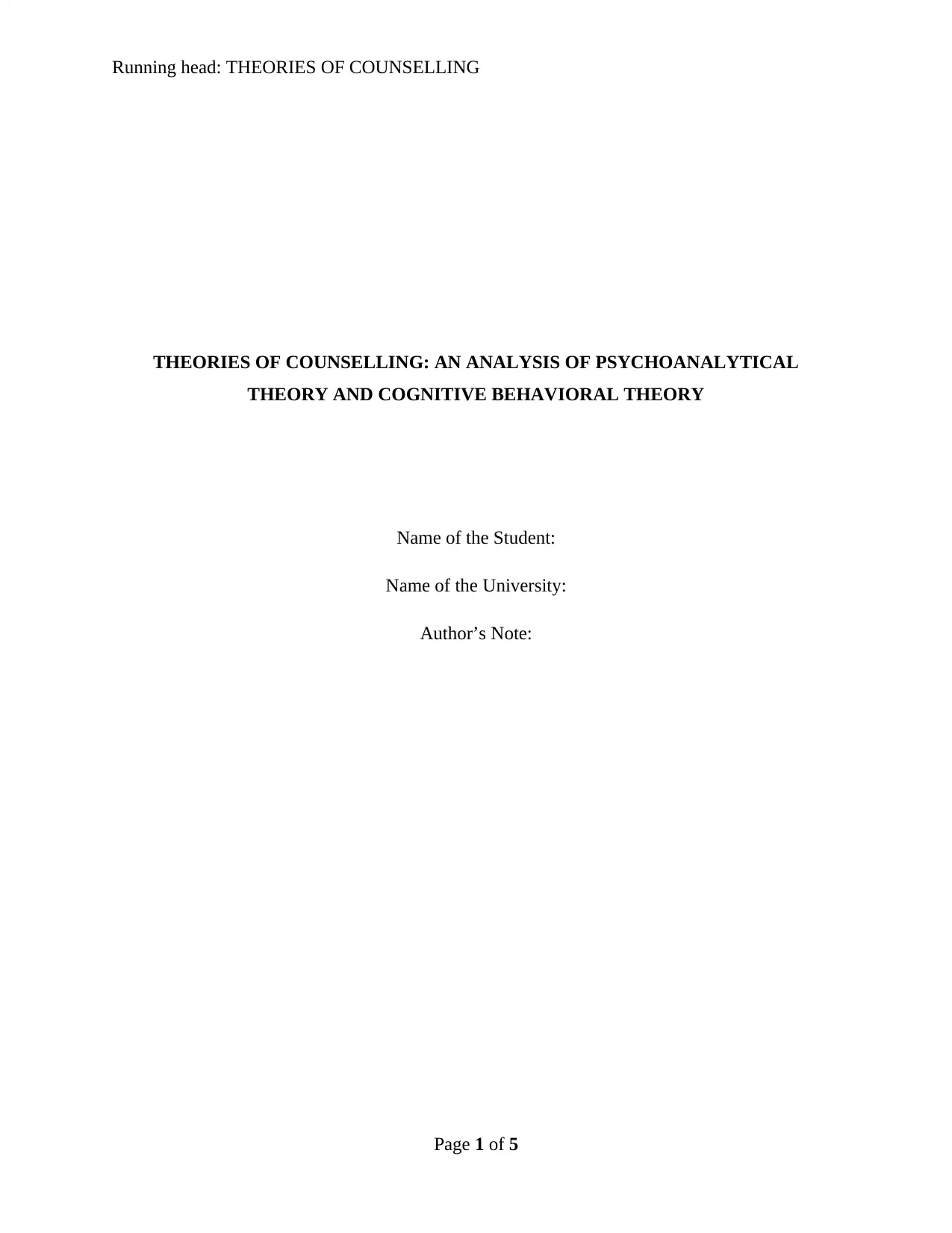
Running head: THEORIES OF COUNSELLING
THEORIES OF COUNSELLING: AN ANALYSIS OF PSYCHOANALYTICAL
THEORY AND COGNITIVE BEHAVIORAL THEORY
Name of the Student:
Name of the University:
Author’s Note:
Page 1 of 5
THEORIES OF COUNSELLING: AN ANALYSIS OF PSYCHOANALYTICAL
THEORY AND COGNITIVE BEHAVIORAL THEORY
Name of the Student:
Name of the University:
Author’s Note:
Page 1 of 5
Paraphrase This Document
Need a fresh take? Get an instant paraphrase of this document with our AI Paraphraser
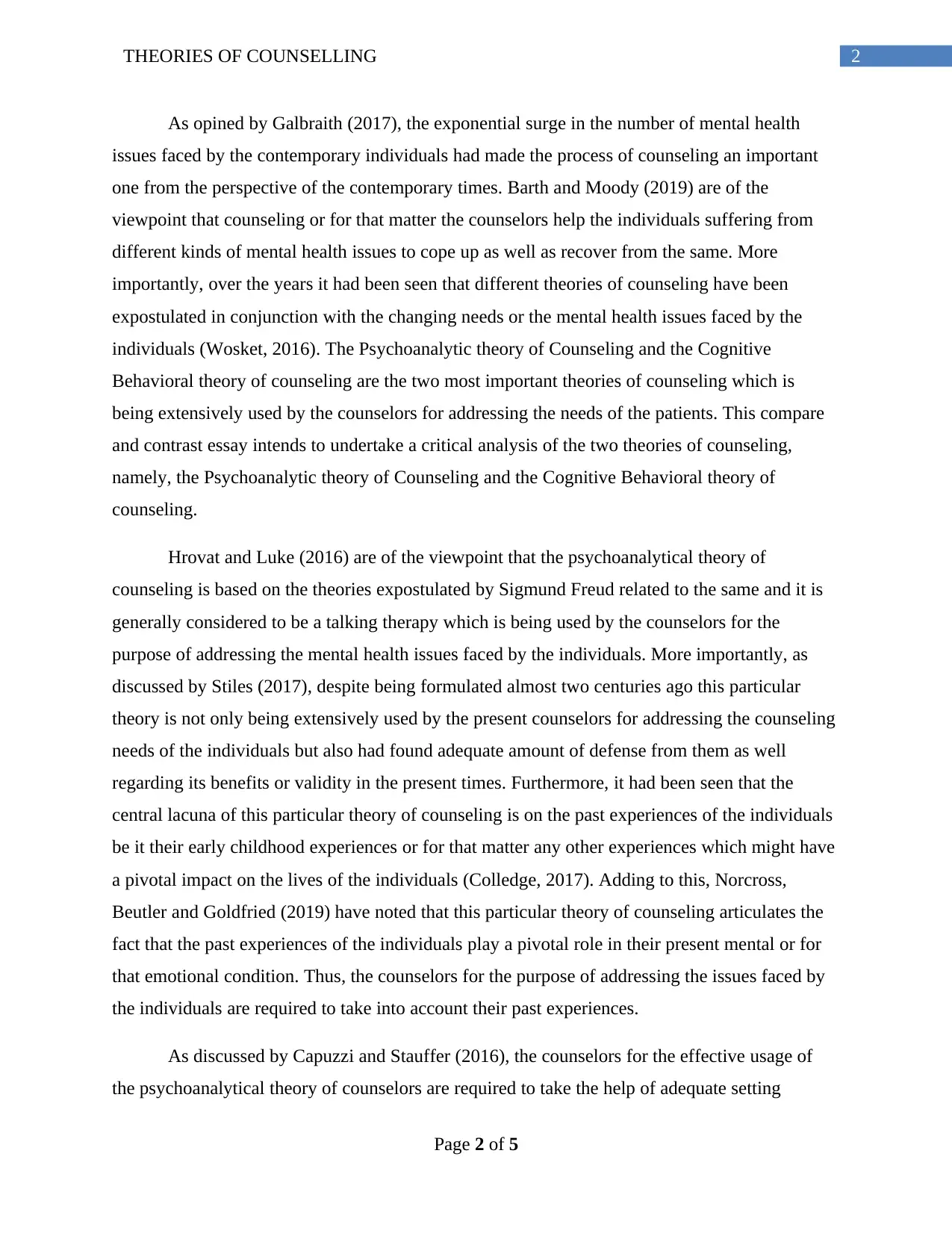
2THEORIES OF COUNSELLING
As opined by Galbraith (2017), the exponential surge in the number of mental health
issues faced by the contemporary individuals had made the process of counseling an important
one from the perspective of the contemporary times. Barth and Moody (2019) are of the
viewpoint that counseling or for that matter the counselors help the individuals suffering from
different kinds of mental health issues to cope up as well as recover from the same. More
importantly, over the years it had been seen that different theories of counseling have been
expostulated in conjunction with the changing needs or the mental health issues faced by the
individuals (Wosket, 2016). The Psychoanalytic theory of Counseling and the Cognitive
Behavioral theory of counseling are the two most important theories of counseling which is
being extensively used by the counselors for addressing the needs of the patients. This compare
and contrast essay intends to undertake a critical analysis of the two theories of counseling,
namely, the Psychoanalytic theory of Counseling and the Cognitive Behavioral theory of
counseling.
Hrovat and Luke (2016) are of the viewpoint that the psychoanalytical theory of
counseling is based on the theories expostulated by Sigmund Freud related to the same and it is
generally considered to be a talking therapy which is being used by the counselors for the
purpose of addressing the mental health issues faced by the individuals. More importantly, as
discussed by Stiles (2017), despite being formulated almost two centuries ago this particular
theory is not only being extensively used by the present counselors for addressing the counseling
needs of the individuals but also had found adequate amount of defense from them as well
regarding its benefits or validity in the present times. Furthermore, it had been seen that the
central lacuna of this particular theory of counseling is on the past experiences of the individuals
be it their early childhood experiences or for that matter any other experiences which might have
a pivotal impact on the lives of the individuals (Colledge, 2017). Adding to this, Norcross,
Beutler and Goldfried (2019) have noted that this particular theory of counseling articulates the
fact that the past experiences of the individuals play a pivotal role in their present mental or for
that emotional condition. Thus, the counselors for the purpose of addressing the issues faced by
the individuals are required to take into account their past experiences.
As discussed by Capuzzi and Stauffer (2016), the counselors for the effective usage of
the psychoanalytical theory of counselors are required to take the help of adequate setting
Page 2 of 5
As opined by Galbraith (2017), the exponential surge in the number of mental health
issues faced by the contemporary individuals had made the process of counseling an important
one from the perspective of the contemporary times. Barth and Moody (2019) are of the
viewpoint that counseling or for that matter the counselors help the individuals suffering from
different kinds of mental health issues to cope up as well as recover from the same. More
importantly, over the years it had been seen that different theories of counseling have been
expostulated in conjunction with the changing needs or the mental health issues faced by the
individuals (Wosket, 2016). The Psychoanalytic theory of Counseling and the Cognitive
Behavioral theory of counseling are the two most important theories of counseling which is
being extensively used by the counselors for addressing the needs of the patients. This compare
and contrast essay intends to undertake a critical analysis of the two theories of counseling,
namely, the Psychoanalytic theory of Counseling and the Cognitive Behavioral theory of
counseling.
Hrovat and Luke (2016) are of the viewpoint that the psychoanalytical theory of
counseling is based on the theories expostulated by Sigmund Freud related to the same and it is
generally considered to be a talking therapy which is being used by the counselors for the
purpose of addressing the mental health issues faced by the individuals. More importantly, as
discussed by Stiles (2017), despite being formulated almost two centuries ago this particular
theory is not only being extensively used by the present counselors for addressing the counseling
needs of the individuals but also had found adequate amount of defense from them as well
regarding its benefits or validity in the present times. Furthermore, it had been seen that the
central lacuna of this particular theory of counseling is on the past experiences of the individuals
be it their early childhood experiences or for that matter any other experiences which might have
a pivotal impact on the lives of the individuals (Colledge, 2017). Adding to this, Norcross,
Beutler and Goldfried (2019) have noted that this particular theory of counseling articulates the
fact that the past experiences of the individuals play a pivotal role in their present mental or for
that emotional condition. Thus, the counselors for the purpose of addressing the issues faced by
the individuals are required to take into account their past experiences.
As discussed by Capuzzi and Stauffer (2016), the counselors for the effective usage of
the psychoanalytical theory of counselors are required to take the help of adequate setting
Page 2 of 5
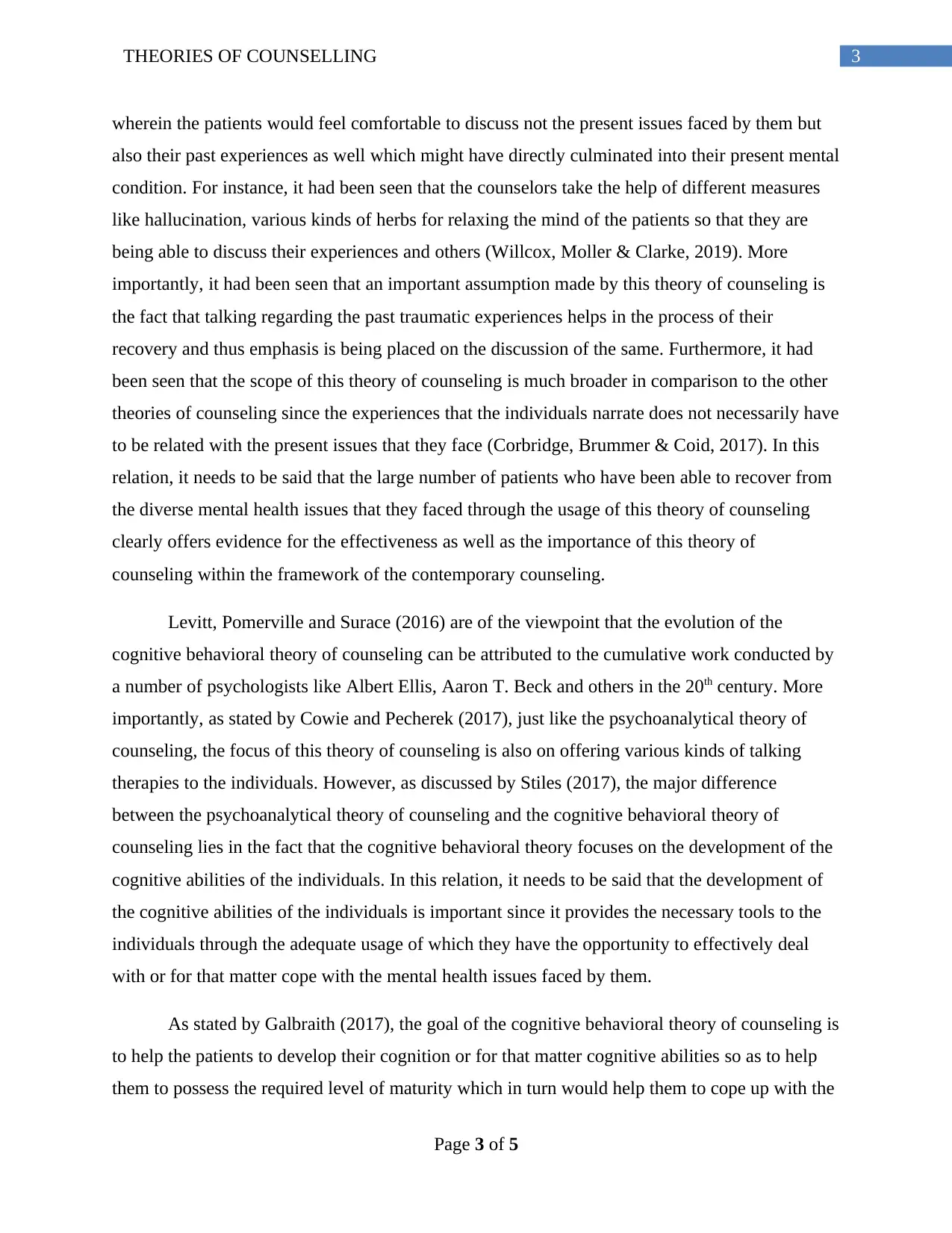
3THEORIES OF COUNSELLING
wherein the patients would feel comfortable to discuss not the present issues faced by them but
also their past experiences as well which might have directly culminated into their present mental
condition. For instance, it had been seen that the counselors take the help of different measures
like hallucination, various kinds of herbs for relaxing the mind of the patients so that they are
being able to discuss their experiences and others (Willcox, Moller & Clarke, 2019). More
importantly, it had been seen that an important assumption made by this theory of counseling is
the fact that talking regarding the past traumatic experiences helps in the process of their
recovery and thus emphasis is being placed on the discussion of the same. Furthermore, it had
been seen that the scope of this theory of counseling is much broader in comparison to the other
theories of counseling since the experiences that the individuals narrate does not necessarily have
to be related with the present issues that they face (Corbridge, Brummer & Coid, 2017). In this
relation, it needs to be said that the large number of patients who have been able to recover from
the diverse mental health issues that they faced through the usage of this theory of counseling
clearly offers evidence for the effectiveness as well as the importance of this theory of
counseling within the framework of the contemporary counseling.
Levitt, Pomerville and Surace (2016) are of the viewpoint that the evolution of the
cognitive behavioral theory of counseling can be attributed to the cumulative work conducted by
a number of psychologists like Albert Ellis, Aaron T. Beck and others in the 20th century. More
importantly, as stated by Cowie and Pecherek (2017), just like the psychoanalytical theory of
counseling, the focus of this theory of counseling is also on offering various kinds of talking
therapies to the individuals. However, as discussed by Stiles (2017), the major difference
between the psychoanalytical theory of counseling and the cognitive behavioral theory of
counseling lies in the fact that the cognitive behavioral theory focuses on the development of the
cognitive abilities of the individuals. In this relation, it needs to be said that the development of
the cognitive abilities of the individuals is important since it provides the necessary tools to the
individuals through the adequate usage of which they have the opportunity to effectively deal
with or for that matter cope with the mental health issues faced by them.
As stated by Galbraith (2017), the goal of the cognitive behavioral theory of counseling is
to help the patients to develop their cognition or for that matter cognitive abilities so as to help
them to possess the required level of maturity which in turn would help them to cope up with the
Page 3 of 5
wherein the patients would feel comfortable to discuss not the present issues faced by them but
also their past experiences as well which might have directly culminated into their present mental
condition. For instance, it had been seen that the counselors take the help of different measures
like hallucination, various kinds of herbs for relaxing the mind of the patients so that they are
being able to discuss their experiences and others (Willcox, Moller & Clarke, 2019). More
importantly, it had been seen that an important assumption made by this theory of counseling is
the fact that talking regarding the past traumatic experiences helps in the process of their
recovery and thus emphasis is being placed on the discussion of the same. Furthermore, it had
been seen that the scope of this theory of counseling is much broader in comparison to the other
theories of counseling since the experiences that the individuals narrate does not necessarily have
to be related with the present issues that they face (Corbridge, Brummer & Coid, 2017). In this
relation, it needs to be said that the large number of patients who have been able to recover from
the diverse mental health issues that they faced through the usage of this theory of counseling
clearly offers evidence for the effectiveness as well as the importance of this theory of
counseling within the framework of the contemporary counseling.
Levitt, Pomerville and Surace (2016) are of the viewpoint that the evolution of the
cognitive behavioral theory of counseling can be attributed to the cumulative work conducted by
a number of psychologists like Albert Ellis, Aaron T. Beck and others in the 20th century. More
importantly, as stated by Cowie and Pecherek (2017), just like the psychoanalytical theory of
counseling, the focus of this theory of counseling is also on offering various kinds of talking
therapies to the individuals. However, as discussed by Stiles (2017), the major difference
between the psychoanalytical theory of counseling and the cognitive behavioral theory of
counseling lies in the fact that the cognitive behavioral theory focuses on the development of the
cognitive abilities of the individuals. In this relation, it needs to be said that the development of
the cognitive abilities of the individuals is important since it provides the necessary tools to the
individuals through the adequate usage of which they have the opportunity to effectively deal
with or for that matter cope with the mental health issues faced by them.
As stated by Galbraith (2017), the goal of the cognitive behavioral theory of counseling is
to help the patients to develop their cognition or for that matter cognitive abilities so as to help
them to possess the required level of maturity which in turn would help them to cope up with the
Page 3 of 5
⊘ This is a preview!⊘
Do you want full access?
Subscribe today to unlock all pages.

Trusted by 1+ million students worldwide
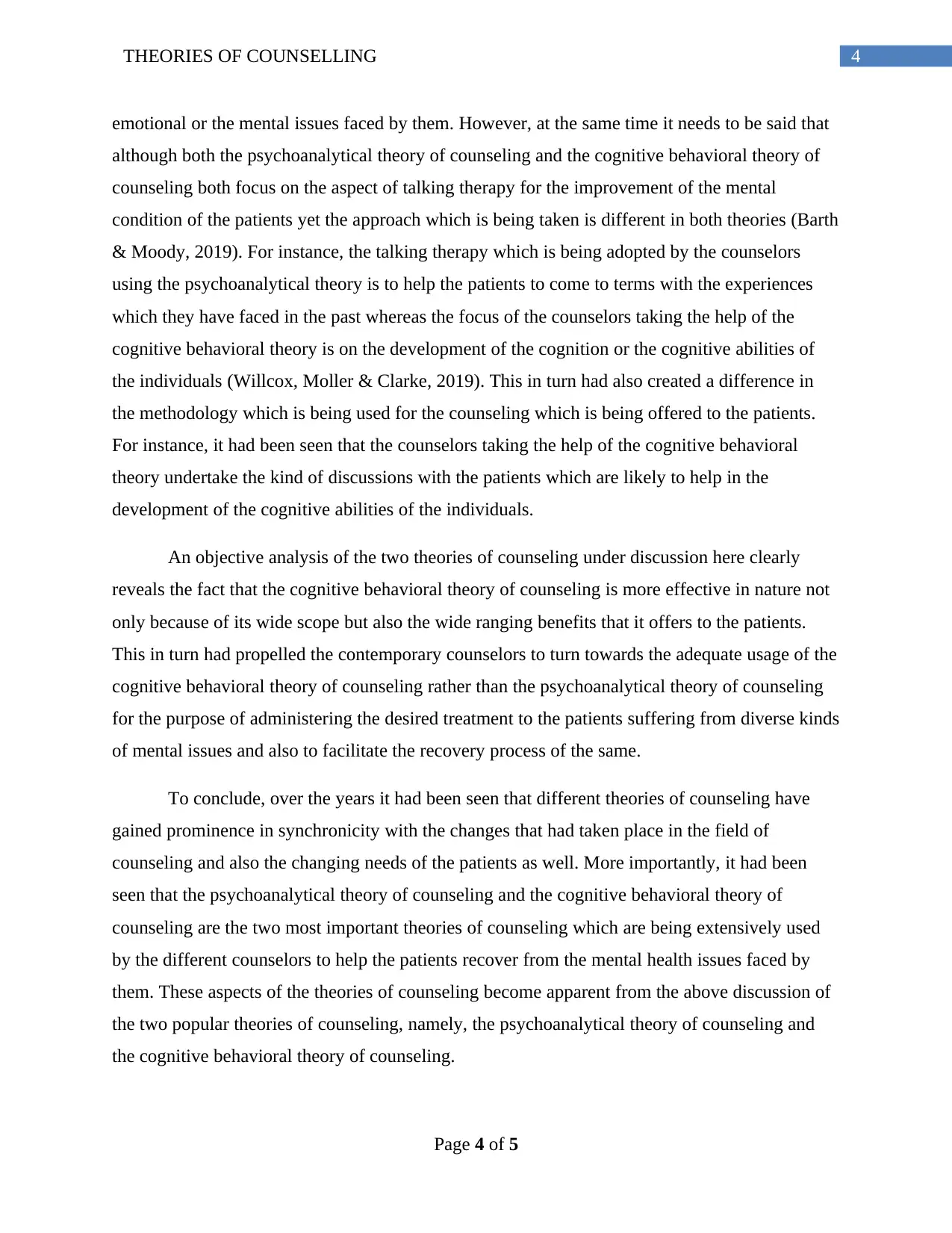
4THEORIES OF COUNSELLING
emotional or the mental issues faced by them. However, at the same time it needs to be said that
although both the psychoanalytical theory of counseling and the cognitive behavioral theory of
counseling both focus on the aspect of talking therapy for the improvement of the mental
condition of the patients yet the approach which is being taken is different in both theories (Barth
& Moody, 2019). For instance, the talking therapy which is being adopted by the counselors
using the psychoanalytical theory is to help the patients to come to terms with the experiences
which they have faced in the past whereas the focus of the counselors taking the help of the
cognitive behavioral theory is on the development of the cognition or the cognitive abilities of
the individuals (Willcox, Moller & Clarke, 2019). This in turn had also created a difference in
the methodology which is being used for the counseling which is being offered to the patients.
For instance, it had been seen that the counselors taking the help of the cognitive behavioral
theory undertake the kind of discussions with the patients which are likely to help in the
development of the cognitive abilities of the individuals.
An objective analysis of the two theories of counseling under discussion here clearly
reveals the fact that the cognitive behavioral theory of counseling is more effective in nature not
only because of its wide scope but also the wide ranging benefits that it offers to the patients.
This in turn had propelled the contemporary counselors to turn towards the adequate usage of the
cognitive behavioral theory of counseling rather than the psychoanalytical theory of counseling
for the purpose of administering the desired treatment to the patients suffering from diverse kinds
of mental issues and also to facilitate the recovery process of the same.
To conclude, over the years it had been seen that different theories of counseling have
gained prominence in synchronicity with the changes that had taken place in the field of
counseling and also the changing needs of the patients as well. More importantly, it had been
seen that the psychoanalytical theory of counseling and the cognitive behavioral theory of
counseling are the two most important theories of counseling which are being extensively used
by the different counselors to help the patients recover from the mental health issues faced by
them. These aspects of the theories of counseling become apparent from the above discussion of
the two popular theories of counseling, namely, the psychoanalytical theory of counseling and
the cognitive behavioral theory of counseling.
Page 4 of 5
emotional or the mental issues faced by them. However, at the same time it needs to be said that
although both the psychoanalytical theory of counseling and the cognitive behavioral theory of
counseling both focus on the aspect of talking therapy for the improvement of the mental
condition of the patients yet the approach which is being taken is different in both theories (Barth
& Moody, 2019). For instance, the talking therapy which is being adopted by the counselors
using the psychoanalytical theory is to help the patients to come to terms with the experiences
which they have faced in the past whereas the focus of the counselors taking the help of the
cognitive behavioral theory is on the development of the cognition or the cognitive abilities of
the individuals (Willcox, Moller & Clarke, 2019). This in turn had also created a difference in
the methodology which is being used for the counseling which is being offered to the patients.
For instance, it had been seen that the counselors taking the help of the cognitive behavioral
theory undertake the kind of discussions with the patients which are likely to help in the
development of the cognitive abilities of the individuals.
An objective analysis of the two theories of counseling under discussion here clearly
reveals the fact that the cognitive behavioral theory of counseling is more effective in nature not
only because of its wide scope but also the wide ranging benefits that it offers to the patients.
This in turn had propelled the contemporary counselors to turn towards the adequate usage of the
cognitive behavioral theory of counseling rather than the psychoanalytical theory of counseling
for the purpose of administering the desired treatment to the patients suffering from diverse kinds
of mental issues and also to facilitate the recovery process of the same.
To conclude, over the years it had been seen that different theories of counseling have
gained prominence in synchronicity with the changes that had taken place in the field of
counseling and also the changing needs of the patients as well. More importantly, it had been
seen that the psychoanalytical theory of counseling and the cognitive behavioral theory of
counseling are the two most important theories of counseling which are being extensively used
by the different counselors to help the patients recover from the mental health issues faced by
them. These aspects of the theories of counseling become apparent from the above discussion of
the two popular theories of counseling, namely, the psychoanalytical theory of counseling and
the cognitive behavioral theory of counseling.
Page 4 of 5
Paraphrase This Document
Need a fresh take? Get an instant paraphrase of this document with our AI Paraphraser
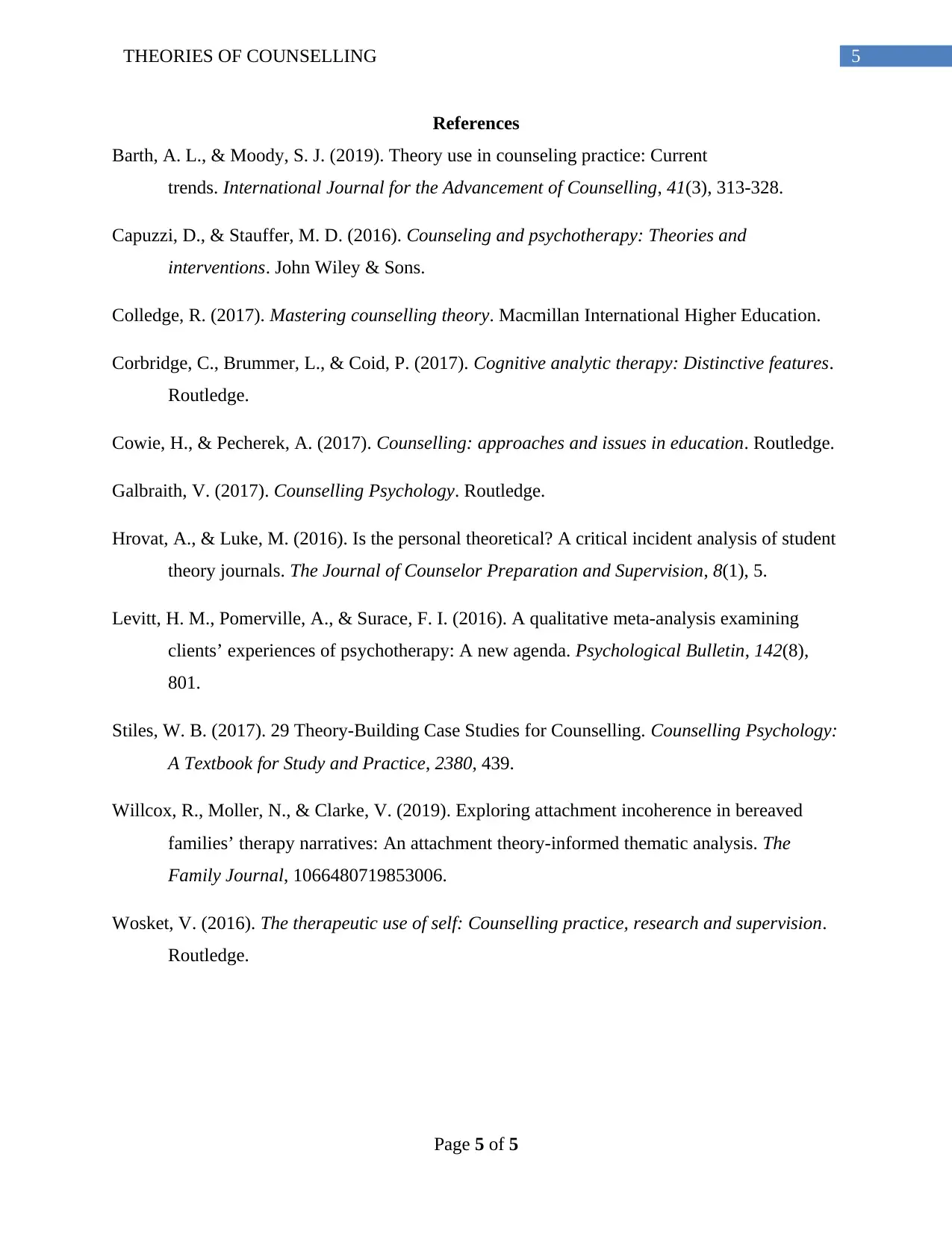
5THEORIES OF COUNSELLING
References
Barth, A. L., & Moody, S. J. (2019). Theory use in counseling practice: Current
trends. International Journal for the Advancement of Counselling, 41(3), 313-328.
Capuzzi, D., & Stauffer, M. D. (2016). Counseling and psychotherapy: Theories and
interventions. John Wiley & Sons.
Colledge, R. (2017). Mastering counselling theory. Macmillan International Higher Education.
Corbridge, C., Brummer, L., & Coid, P. (2017). Cognitive analytic therapy: Distinctive features.
Routledge.
Cowie, H., & Pecherek, A. (2017). Counselling: approaches and issues in education. Routledge.
Galbraith, V. (2017). Counselling Psychology. Routledge.
Hrovat, A., & Luke, M. (2016). Is the personal theoretical? A critical incident analysis of student
theory journals. The Journal of Counselor Preparation and Supervision, 8(1), 5.
Levitt, H. M., Pomerville, A., & Surace, F. I. (2016). A qualitative meta-analysis examining
clients’ experiences of psychotherapy: A new agenda. Psychological Bulletin, 142(8),
801.
Stiles, W. B. (2017). 29 Theory-Building Case Studies for Counselling. Counselling Psychology:
A Textbook for Study and Practice, 2380, 439.
Willcox, R., Moller, N., & Clarke, V. (2019). Exploring attachment incoherence in bereaved
families’ therapy narratives: An attachment theory-informed thematic analysis. The
Family Journal, 1066480719853006.
Wosket, V. (2016). The therapeutic use of self: Counselling practice, research and supervision.
Routledge.
Page 5 of 5
References
Barth, A. L., & Moody, S. J. (2019). Theory use in counseling practice: Current
trends. International Journal for the Advancement of Counselling, 41(3), 313-328.
Capuzzi, D., & Stauffer, M. D. (2016). Counseling and psychotherapy: Theories and
interventions. John Wiley & Sons.
Colledge, R. (2017). Mastering counselling theory. Macmillan International Higher Education.
Corbridge, C., Brummer, L., & Coid, P. (2017). Cognitive analytic therapy: Distinctive features.
Routledge.
Cowie, H., & Pecherek, A. (2017). Counselling: approaches and issues in education. Routledge.
Galbraith, V. (2017). Counselling Psychology. Routledge.
Hrovat, A., & Luke, M. (2016). Is the personal theoretical? A critical incident analysis of student
theory journals. The Journal of Counselor Preparation and Supervision, 8(1), 5.
Levitt, H. M., Pomerville, A., & Surace, F. I. (2016). A qualitative meta-analysis examining
clients’ experiences of psychotherapy: A new agenda. Psychological Bulletin, 142(8),
801.
Stiles, W. B. (2017). 29 Theory-Building Case Studies for Counselling. Counselling Psychology:
A Textbook for Study and Practice, 2380, 439.
Willcox, R., Moller, N., & Clarke, V. (2019). Exploring attachment incoherence in bereaved
families’ therapy narratives: An attachment theory-informed thematic analysis. The
Family Journal, 1066480719853006.
Wosket, V. (2016). The therapeutic use of self: Counselling practice, research and supervision.
Routledge.
Page 5 of 5
1 out of 5
Related Documents
Your All-in-One AI-Powered Toolkit for Academic Success.
+13062052269
info@desklib.com
Available 24*7 on WhatsApp / Email
![[object Object]](/_next/static/media/star-bottom.7253800d.svg)
Unlock your academic potential
Copyright © 2020–2026 A2Z Services. All Rights Reserved. Developed and managed by ZUCOL.





